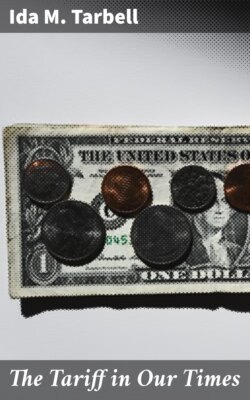The Tariff in Our Times

Реклама. ООО «ЛитРес», ИНН: 7719571260.
Оглавление
Ida M. Tarbell. The Tariff in Our Times
The Tariff in Our Times
Table of Contents
THE TARIFF IN OUR TIMES
PREFACE
CHAPTER I. THE TARIFF AS A WAR TAX
CHAPTER II. AN OUTBREAK OF PROTECTIONISM
CHAPTER III. THE WAR TARIFFS CONTINUED
CHAPTER IV. THE BUSINESS MAN TAKES CHARGE
CHAPTER V. THE MONGREL BILL OF 1883
CHAPTER VI. GROVER CLEVELAND AND THE TARIFF
CHAPTER VII. THE MILLS AND ALLISON BILLS
CHAPTER VIII. THE McKINLEY BILL
CHAPTER IX. THE WILSON BILL
CHAPTER X. THE DINGLEY BILL
CHAPTER XI. WHERE EVERY PENNY COUNTS
CHAPTER XII. THE MAKING OF THE BILL OF 1909
CHAPTER XIII. SOME INTELLECTUAL AND MORAL ASPECTS OF OUR TARIFF-MAKING
INDEX
Отрывок из книги
Ida M. Tarbell
Published by Good Press, 2022
.....
In May, 1860, he was still of the same opinion on making the tariff an issue. “I now think,” he wrote the same correspondent, “that the tariff question ought not to be agitated in the Chicago Convention, but that all should be satisfied on that point with a presidential candidate whose antecedents give assurance that he would neither seek to force a tariff law by executive influence nor yet to arrest a reasonable one by a veto or otherwise.” After his nomination and election he steadily refused to say anything on the question. It was not, in fact, until February 15 (1861), when he reached Pittsburg on his way to his inauguration, that he uttered a word. In Pennsylvania, however, some expression was unavoidable. The tariff had played a greater part in that state in electing Mr. Lincoln than had slavery and unionism. Indeed, Mr. Blaine does not hesitate to say that if Governor Curtin had not spent most of his time in the campaign advocating protection, the state would have gone Democratic, and if Pennsylvania had gone Democratic, Mr. Lincoln would probably have been defeated. An expression of opinion then was unavoidable, and he gave it;—certainly it was moderate enough. After quoting the tariff plank of the party platform he said modestly: “I have by no means a thoroughly matured judgment upon this subject, especially as to details.... I have long thought it would be to our advantage to produce any necessary article at home which can be made of as good quality and with as little labor at home as abroad. At least by the difference of the carrying from abroad. In such cases the carrying is demonstrably a dead loss of labor....” After developing this argument, which was one of his strongest early ones and the only one of which full notes have been saved to us, he added: “The condition of the Treasury would seem to render an early revision of the tariff indispensable,” and he went on to advise “every gentleman who knows he is to be a member of the next Congress to take an enlarged view and post himself thoroughly so as to contribute his part to such an adjustment of the tariff as shall produce a sufficient revenue, and in its other bearings, so far as possible, be just and equal to all sections of the country and classes of the people.”
There is nothing to show that after he reached Washington Mr. Lincoln ever considered the tariff other than as one of the several methods by which money could be raised. If he saw, as he probably did, that there were many injustices in the measures passed, that some duties were too high for revenue and beneficial only to the special interests which had fought for them, that others were trades outright, he still knew that, all things considered, the bills were as good as could be expected. It is probable indeed that none of the important legislation of the war received less attention from the president than the tariff bills.
.....